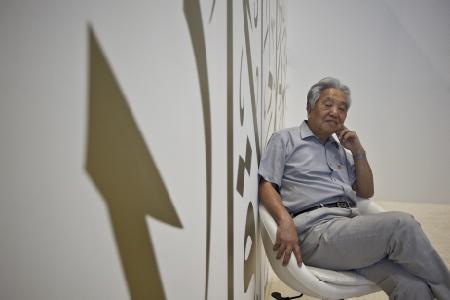Zhong Jikun, professor of Arabic studies at Peking University, talks about the work that earned him the 2011 "Cultural Personality of the Year" award from the Sheikh Zayed Foundation.

Zhong Jikun at the Abu Dhabi International Book Fair, where he was named Cultural Personality of the Year for his work translating Arabic texts into Chinese.
At first glance, Zhong Jikun cuts an unassuming figure among the crowd at the Abu Dhabi International Book Fair. But the constant stream of admirers, particularly the Emirati students who stop by to greet him, gives some indication of the esteem he commands in the Arab world a prize high enough to earn him the title of 2011 Cultural Personality of the Year, an honor bestowed annually as part of the Sheikh Zayed Book Awards.
As professor of Arabic studies at Peking University in Beijing and head of the Chinese Society for Arabic Literature Studies, Zhong produced last year s mammoth two-part Chinese History of Arabic Literature. He accepted the award, which includes a Dh1 million cash element, at a ceremony in the Emirates Palace hotel last week. The citation praised his 50-year academic career as instrumental in rooting the Arabic language in the Far East.
In classical Arabic, Zhong described receiving the award as unbelievable.
I consider myself a vivid dreamer, he said. I have dreamt more than one thousand and one dreams. But to receive this honor was something beyond my imagination.
His work includes Chinese translations of the Egyptian writer Naguib Mahfooz and the work of the Lebanese poet Khalil Gibran.
Born in 1938 in Northeast China, Zhong grew up in an atmosphere of education, and credits his mother, a primary schoolteacher, with encouraging his early love of reading. It was through a Chinese copy of the Thousand and One Nights that he first encountered the Arab world while still a boy.
I remember that the majority of my childhood was spent reading and listening to these stories, he recalls. I remember feeling fascinated by this world that was very exotic and magical.
But it was the hard realities of Middle Eastern politics that pushed Zhong to enroll in Arabic studies at Peking University in 1956. At that time former Egyptian president Gamal Abdel Nasser nationalized the Suez Canal and his people rose up against the tripartite forces, he says.
I was part of a youth movement and we demonstrated in solidarity with the Egyptians. We would stand in front of the Egyptian Embassy and that s where I learnt my first Arabic expression: Long live Egypt and down with the occupation.
But Zhong s revolutionary fervor soon gave way to the grueling work of mastering the intricacies of the Arabic language, which he says shares with Chinese languages the distinction of being widely regarded as among the most difficult to learn.
It is the language of the Quran and spoken by millions of people and it has always been viewed as extremely valuable, he adds. In Eastern Europe for example, diplomats who knew a Chinese language were given a salary rise of 10 per cent while those who knew Arabic got double that.
Zhong says China s first efforts to translate Arabic go back to the mid-18th century, when Chinese Muslim scholars translated selected verses of the Quran. But the first Arabic title to hit the mainland, in the early 1900s, was the Thousand and One Nights, though in a translation derived from secondary sources such as English and Japanese texts.
Authentic Chinese translations direct from the Arabic started to appear in the 1920s with selections by Gibran appearing in Chinese literary magazines.
Zhong, who continues to translate selected Arabic titles, says translating Arabic fiction and poetry requires a deft touch. He explains that Chinese Arabists navigate a fine line between being faithful to the text while entertaining the reader.
When translating literature like the ancient poems of Imru al Qays and Zuhair bin Abi-Salma there are principles I follow such as being fair to the author and audience, he explains. This means the translations need to be precise as well as accommodating to the audience s cultural concepts and expectations.
Zhong compiled selections of his translations into his History of Arabic Literature, which also includes profiles of leading Arab writers and poets. He views the encyclopedia as his life s work and hopes it will act as a launch pad for future Chinese Arabists.
When asked if he has any more dreams to fulfill, Zhong laughs.
At 73 I don t know if I have another dream, he says. But I do hope my students will continue my work and keep building that bridge between modern Arabic literature to the Chinese people.
Reported by: Saeed Saeed
Edited by: Arthars
Source: The National
Related News
Photos
More>>history
Traditions
- Meeting for Beijing Forum 2008 Review & Beijing Forum 2009 Planning Convened
- 2008 China's Top 10 Discoveries in Archeology Unveiled
- PKU Held Forum to Commemorate 30th Anniversary of Reform and Opening Up
- School of Urban Planning and Design Inaugurated in Shenzhen
- "Landscape Urbanism" and "Negative Approach Planning"





